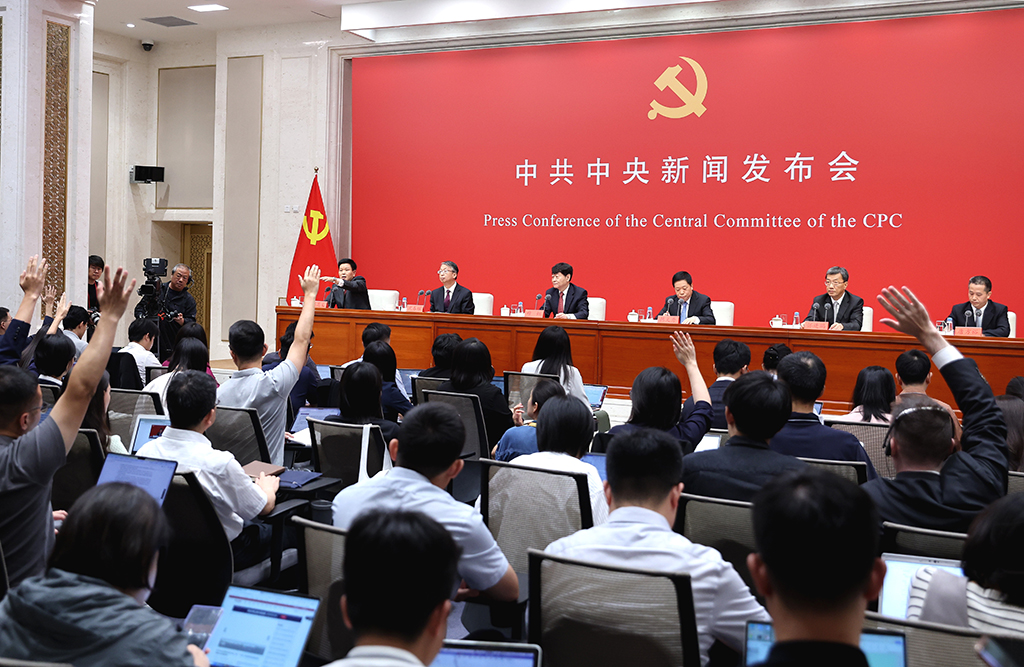Why the third plenums are of significance globally


The highly anticipated and keenly-watched third plenary session of the 20th Central Committee of the Communist Party of China has concluded in Beijing.
Since the third plenary session of the 11th Central Committee of the CPC in 1978, the third plenums have held special significance, not least for their policy setting agenda, especially on issues of economic modernization.
The iconic third plenary session of the 11th Central Committee of the CPC was when the party decided to put economic modernization at the core of its work and put forward reform and opening-up to the outside world, the two policies that propelled China to the stratosphere of economic growth.
It was the fastest economic growth in history. It was not growth for growth sake, but growth that delivered concrete improvement in the living conditions of more than 800 million people by lifting them out of extreme poverty.
The third plenary session of the 20th Central Committee of the CPC which began on July 15 and concluded July 18 has again underlined the significance of the third plenums as fundamentally practical problem solving, hope reinvigorating, confidence enabling and optimistically forward-looking.
In the final communique of the meeting, the top leadership examined issues relating to comprehensively further deepening reforms with a view to advancing China's modernization.
Reflecting on the party's work since the 20th National Congress of the Party which was held in 2022, the plenary attendees agreed that firm strides have been made in building a modern socialist country in all respects. The resolution of further comprehensively deepening reform and opening up not only has implication for maintaining the momentum of China's economic growth for high quality development, but a boon to global recovery for which there is common understanding that China is playing and would continue to play pivotal roles.
The third plenary session of the 20th Central Committee of the CPC outlined general principles of the country's foreseeable economic trajectory in which it promised to foster a high-standard socialist market economy for Chinese modernization.
The importance of the plenary's stance in respect to market reform cannot be lost to developing countries struggling through market related reforms and the imperative of contingency plan in case of a "market failure". Beyond the confidence in market-self driven mechanism, a night-watchman strong and credible State is necessary not only to hold the rings for fair play but to ensure the system's continued health and resilience.
The plenum further outlined that it would "ensure that economic entities under all forms of ownership have equal access to factors of production in accordance with the law, compete in the market on an equal footing and are protected by the law as equals, thus enabling entities under different forms of ownership to complement each other and develop side by side", with further reaffirmation that China "will build a unified national market and refine the systems underpinning the market economy".
These key general principles, which would certainly be worked into specific policy outlines by the government greatly illuminate the path of China's reform and opening up to the outside world, as eternal features and characteristics of contemporary China and which are both irreversible and a continuous work in progress. The implication is China would remain a solid partner to the world as far as openness, inclusiveness, shared responsibility and shared prosperity are the common themes toward which the majority of humanity gravitates.
The third plenary session of the 20th Central Committee of the CPC has again contributed to the manifesto of inclusive globalization that works for all, by reaffirming that China will be open as a bastion of free enterprise. The implications for policy choices in this respect is that its success must reflect in the improvement in the quality of life for the people that "meet people's aspiration for a better life". Many emerging economies have had their growth trajectories vitiated by the growth of special and vested interests and ended up in the so-called middle-income trap, which China has avoided, with the Communist Party of China having neither interest of its own nor of any special interest group, but the broadest interest of the vast majority of the Chinese people.
The third plenary session of the 20th Central Committee reaffirmed that the modernization China pursues is the modernization of peaceful development and reiterated that in foreign relations, the country would continue to be firm in its commitment to independent foreign policy of peace and dedication to promoting a human community with a shared future.
The plenum is not only a platform to outline principles that would guide the country's policy trajectories but also an important moment to reaffirm what the party is, what it stands for and what energizes and provides it with the enormous clarity that drives its vision and purpose. It has demonstrated the discipline, rigor, meticulousness, deliberate and methodical approach to governance from which the so-called "China's economic miracle" was created and is still being qualitatively developed.
The author is director of the Center for China Studies in Abuja, Nigeria.

































